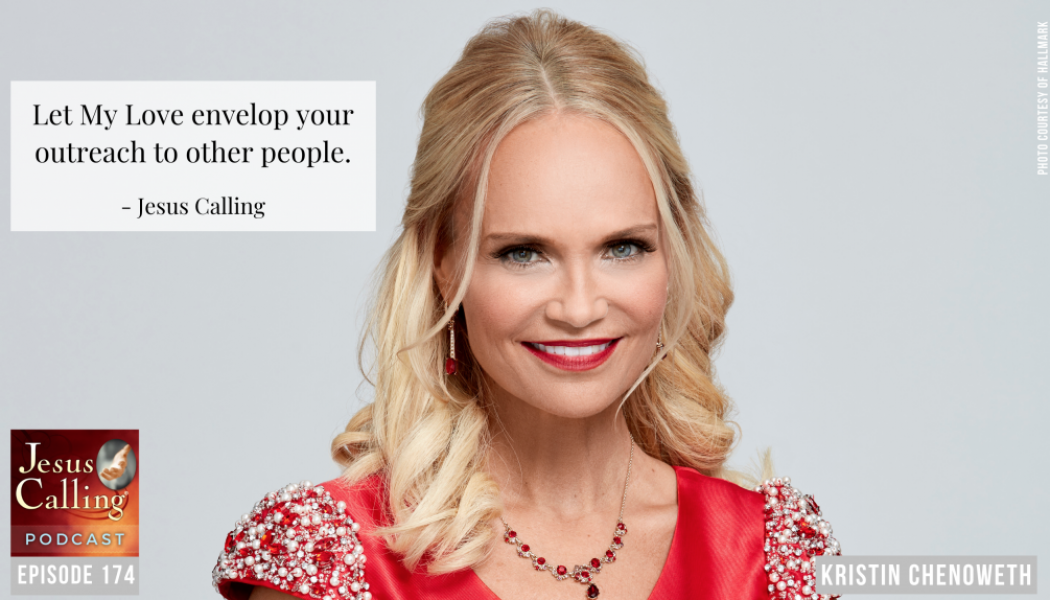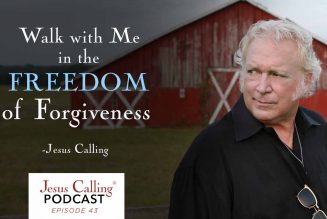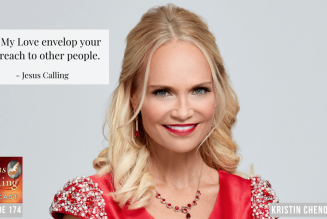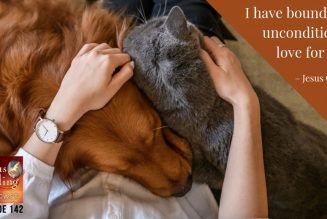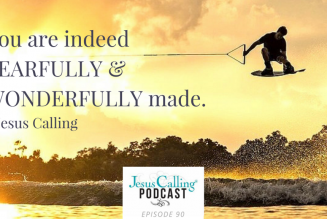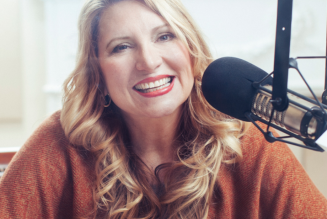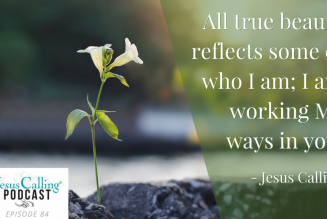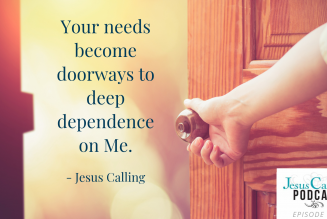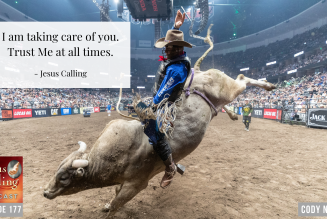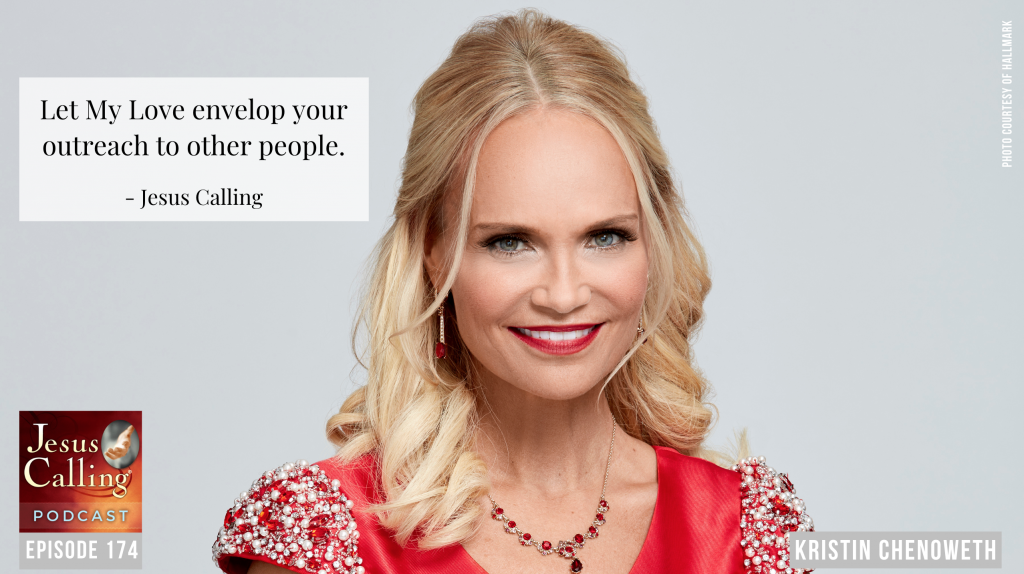
Kristin: I do think that when things get really tough, and I can take a moment and say, “Oh, right. Remember, I’m supposed to walk with you today, and you’re there to take care of all my problems,” there is a peace in that.
Heavenly Connections: Kristin Chenoweth, Joanne Rogers, & Montell Jordan – Episode #174
Narrator: Welcome to the Jesus Calling Podcast. Today’s guests show that when we stay closely connected to God and each other, we become better friends and neighbors to the world: entertainer Kristin Chenoweth; Mister Rogers’ wife, Joanne Rogers; and pastor and R&B sensation, Montell Jordan.
First up, Kristin Chenoweth is a star on the screen and on the stage. Growing up singing in church, Kristin is as comfortable singing in front of a choir as she is performing solos in Broadway plays. She talks with us about her varied career, one of her favorite gifts that actor/producer Rita Wilson gave her, and how her faith has always anchored her through every season of her life.
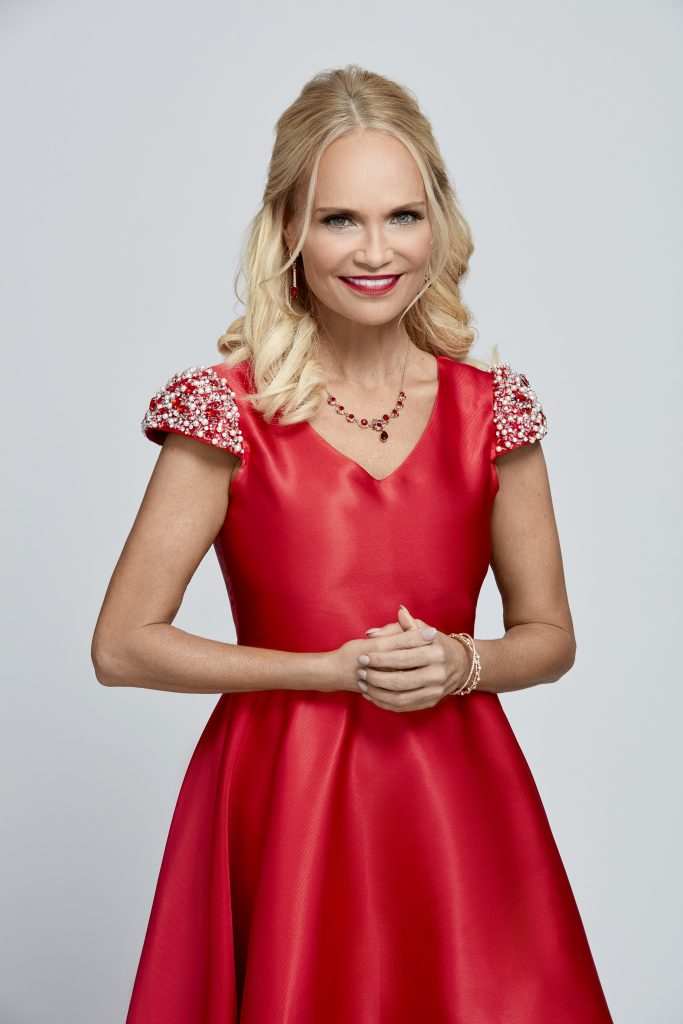
Kristin: I am Kristin Chenoweth: self-admitted petite person, lover of doughnuts and dogs. Oh, and I also do Broadway and TV and film and movies and concerts.
I grew up in a tiny town in Oklahoma called Broken Arrow. I’m so thankful I grew up in the house that I did. I happen to be an adopted child, but the truth is, my mom and dad are my mom and dad. If you met them and you saw us all together, you would say, “That’s their kid.”
Growing up, I learned to play the piano. When I learned music, I was in my piano room writing poetry and listening to music. That’s when I first came to understand what I wanted to do for a living, that’s [where] all the creativity was.
The best gift that they[my parents] gave me is the gift that I think is the most important thing that you can give your child, which is self-esteem. Not to be confused with overconfidence, but just [that lesson of] following your passion and doing it with all your might. Work hard, play hard, love what you do. Life’s short. Don’t live beyond your means. All those things—stay humble. A smile goes a long way. Don’t sweat the small stuff. Those kinds of things that I heard growing up helped me a lot.
“Work hard, play hard, love what you do. Life’s short. Don’t live beyond your means. All those things—stay humble. A smile goes a long way. Don’t sweat the small stuff. Those kinds of things that I heard growing up helped me a lot.” – Kristin Chenoweth
My parents moved to Pennsylvania when I was at OCU in college, so I had a little bit of [introduction] to the East Coast, but there’s nothing that’s going to prepare you for New York. I just remember walking down the street when I moved there and I was saying, “hi,” to everybody. “Hi, hi.” And people were like, “What? What?? Move!” I just didn’t know [things] like have your money ready when you’re going to pay. People yell at you.
But now, I’ve become a New Yorker. I’m like, Gosh, tourists, go faster, and I go back to Oklahoma and my mom’s like, “You need to slow down. We’re in line at McDonald’s and they’re gonna check out their time and you need to slow down. You need to remember your roots.”
A Legacy of Faith
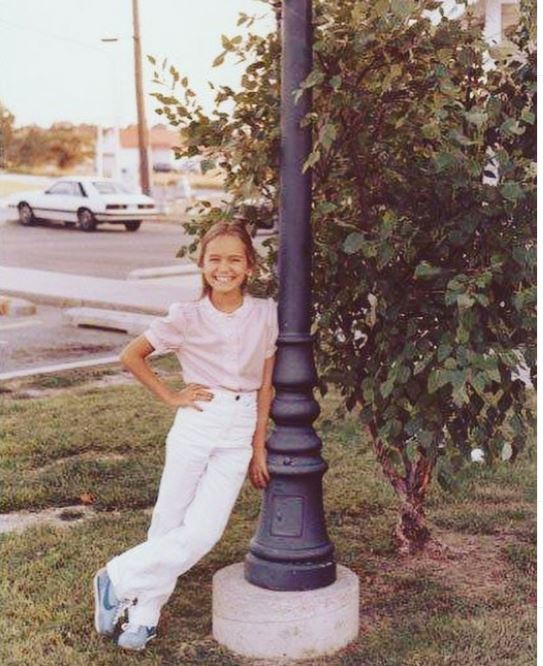
My grandma [was] Mildred Chenoweth, Grandma Chenny is what I called her. She was a great mentor to me, because I can remember walking in—when I was a little girl—from being out on the farm and [getting] dirty and hearing her being really strict. Like, “You got to get in the tub. You got it? You got to help with dinner. Let’s unload the dishwasher. Let’s load the dishwasher. Okay, now let’s watch TV.” We did things together, and that stayed with us. It stayed with me through college, and I’d go there on the weekends sometimes to do my laundry.
This tells a lot about who she is. When she passed away, we were looking through her stuff, and [for the record], she didn’t always say to me, “You’re just so good, look at this news article, I’m so proud of you.” I knew she loved me, but when she passed away, I saw in her closet a big stack of all of the newspaper articles and magazines I’ve done. She’d clipped and saved them.
When she passed away, my cousins and I looked through her Bible, and every margin was filled with comments or questions that she had for God. She wasn’t just as studier of the Bible. She really talked and thought about it and she wrote her thoughts in the margins. And when she wrote questions in the margins, there were literally questions like, “I don’t understand this, remind me to talk to pastor about it.” You could see that she was really [pondering it]. I think that’s what God wants us to do when we read the Bible. How does this apply to me? Make sure you understand it. To this day, I’m calling my mom going, “This doesn’t make sense to me,” just because I still want to talk about it. I want to know. Knowledge is power, and sometimes it’s not even so much that we can understand it, but it might hit us later.
A lot of people say you should do your prayer or meditation or your quiet time, whatever that is for you, in the morning. But for me, it’s a nighttime thing. I can’t sleep, so that is one thing that calms me, that gives me peace. It’s amazing when you get quiet and you turn off the TV and you quit allowing yourself to ping pong your brain and get on get online and answer forty-five things and do social media. Social media is a big one for me, because it’s part of my business.
But getting off of that and just reading the word, praying for fifteen minutes—it can be five minutes, it can be an hour. It’s never timed by me, it’s just how it feels. But for me, it happens at night. And when I don’t do it, I can tell a difference in my week.
“A lot of people say you should do your prayer or meditation or your quiet time, whatever that is for you, in the morning. But for me, it’s a nighttime thing.” – Kristin Chenoweth
That’s why I like Jesus Calling, because I [have] the app and I can read it every day before I start. I tend to read it at night before I go to bed, too.
Rita [Wilson] gave it to me, I want to say ten years ago. It has been my constant, and I just wonder sometimes—we’re good friends—if she knows just how much that gift continues to give to me. I tell her a lot, or she’ll text me, “Did you read Jesus Calling today? Oh my gosh, it was written for me today.” And that’s what I feel. It’s almost like every day you read it, you go, Oh my gosh. That’s exactly what I needed. It always seems to fit.
I’ve given it to so many people. I just recently gave it to my boyfriend, because he lost his copy, and I think it’s important [to have] when you travel. I have one in my bag about this big.
I’ve given it to one of my best friends, who is just the most amazing girl. She’s Jewish, her heritage [is] Jewish, and I said, “Just read it. It’s just an inspirational guide for you every day.” And she loves it. I’ve given the really little ones out to different cast members on Broadway, just saying, “Just read it.” I think it’s a question and a conversation worth having with the people that you love, whether they believe like you or not.
I’d like to read about joy, and this comes [from the Jesus Always passage on] January third. There’s much joy in here. It says:
Be still, and know that I am God. Most Christians are familiar with this command, but not so many take it seriously. Yet for those who do, blessings flow like streams of living water. As these believers sit in stillness—focusing on Me and My Word—their perception of Me expands and their troubles shrink in importance. I want you to share in these blessings, beloved. Take time, take time with Me.
I was just talking up this, see what I mean?
Remember: My Word is a lamp to guide your feet and a light for your path. Biblical thinking illuminates the path before you so you can find your way. It’s crucial to know not only that I am God but that I made you and you are Mine.
My favorite part of this whole thing is it’s crucial to know not only that, “I am God,” but that, “I made you and you are mine.”
Slowing Down to Hear God Speak
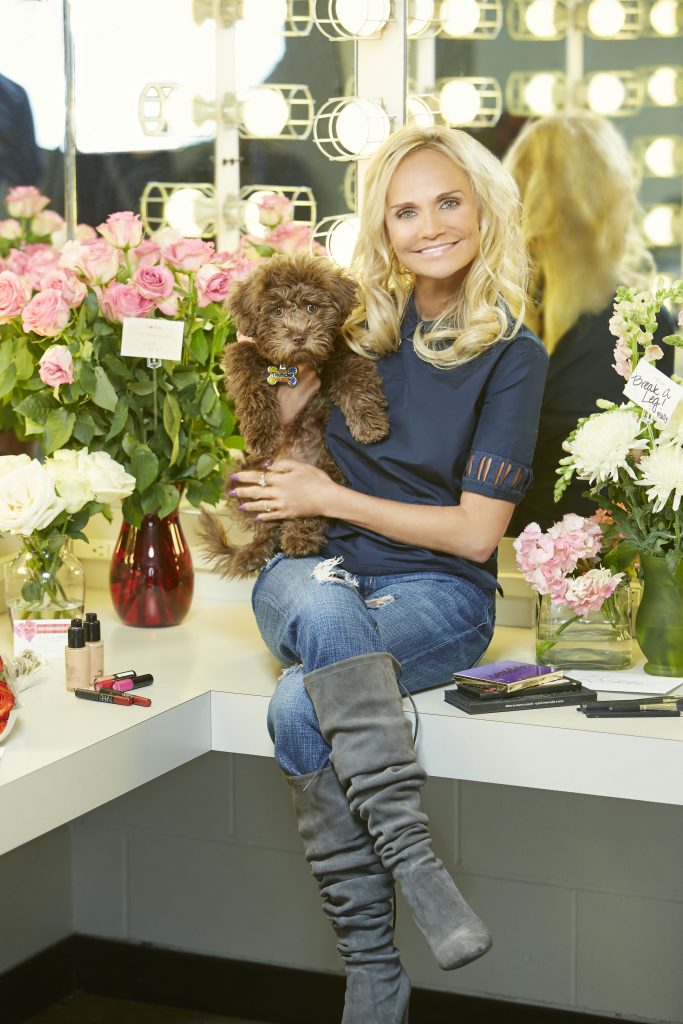
I think, in this life, in this business, especially this industry, faith of some kind is going to work for you. I had a bad accident seven years ago on the set of a TV show. I heard, “Action!” and I woke up in the hospital and had lots of injuries. But mainly what I had was time, time to heal. I don’t always do great with [being] left to my own thoughts because I’m a constant doer, you know. But I believe that sometimes things happen to you so that God can speak, because sometimes you can’t hear when you get too busy. That is a challenge I have still to this day in my life. I get too busy and can’t hear what I’m supposed to hear. Like my mom keeps saying, “You got two ears and one mouth, listen twice as hard.” I don’t think God makes things happen to you, but I think sometimes He allows things to happen to you so you have to get down on your knees and say help.
“I believe that sometimes things happen to you so that God can speak, because sometimes you can’t hear when you get too busy.” – Kristin Chenoweth
It was hard. It was hard because I was in pain, but also I didn’t want to be there healing. I wanted to be doing something. I couldn’t sing. I couldn’t dance. I couldn’t act. I could hardly move. And for a long time, my words were not there on the tip of my tongue, because of getting hit in the brain. It was a lot of prayer and a lot of just like, Are you there, God? And it was, Oh yeah, you’re there, God. I’m here now, too. It was like a three-step.
I knew that I had gotten so busy, and whenever it starts to happen to me now—which is all the time—I go, All right. Remember. Think quiet. Listen. It’s a good lesson. My process in life is slower. My process and learning music and roles, I do it slower, but I think the work is better because of it, because I’m taking the time.
Narrator: One of Kristin’s greatest joys in life is giving back with some of the things she’s learned over her years in entertainment and working with others to help them bring their music and art to the world. She shares some of the special memories she made with her talented friends on her latest studio album For the Girls, and also how she helps up and coming young performers find their own unique talents with her annual “Broadway Bootcamp.”
The Power of Great Girlfriends
Kristin: When I was setting out to do a new record—this was two years ago, after Art of Elegance came out—I was like, What am I going to do now? I made a list of all the songs I want to do and I realized a lot of them were famous women singer-songwriters. I didn’t set out to make a female strong album, but when you look at your material and that’s what’s inspiring you, you’re gonna do it. We’re talking about Dinah Washington, Barbra Streisand, Judy Garland. But we’re also talking about Eva Cassidy and Eydie Gorme, Dolly. We’re talking about Carole King. Patsy Cline, which was very scary for me, because all I can hear is her version in my head of Crazy. Linda Ronstadt. It was all over the map for me growing up. I wanted to celebrate them.
Then I thought, Hey, it’s for the girls. It’s kind of what evolved. I would love to have a couple of girls on there. Who would I want? Well, I’ll never get her. Dolly, I’ll never get her, but I want Reba. Jennifer Hudson, I’m not going to get her because she’s so busy, but she is my buddy. Maybe she’ll say yes. Ariana, who I’ve watched grow up. She’s too busy, she’s not going to do it. And they all said yes.
It felt like a culmination of all the work I’ve done all these years. A few of the people that I think are the best singers in the planet went, “We see you. We want to do it.”
Helping the Next Generation of Performers
I think it’s important, when you have been given opportunities and had success, you need to give it to the people behind you.
“I think it’s important, when you have been given opportunities and had success, you need to give it to the people behind you.” – Kristin Chenoweth
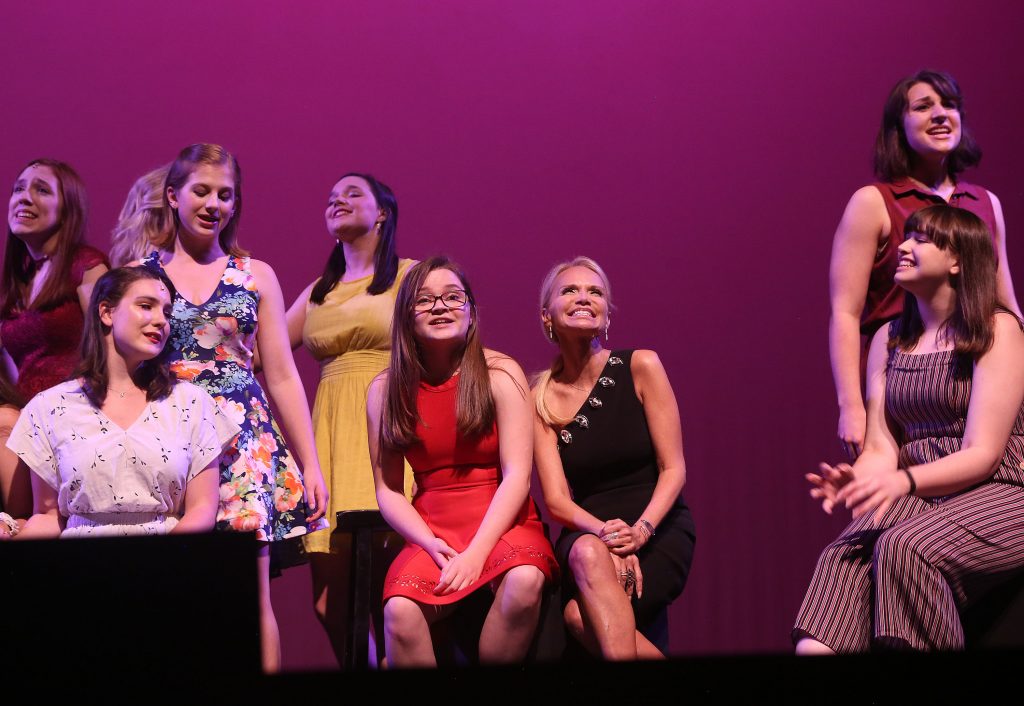
I have the Kristin Chenoweth Arts and Education Fund, and we do a lot of shows at the theater that they named after me in Broken Arrow, Oklahoma. They built a state-of-the-art Performing Arts Center and they named the theater Kristin Chenoweth Theatre.
At first, I thought, What am I gonna do with that? It’s my name. It’s my dad’s name. It’s my grandpa’s name. But when you see it so beautifully done, in such a beautiful building, you think, [I] better do something with it. I started a Broadway boot camp, and this past year was our fifth year. Lots of kids auditioned. I can only take about fifty. It’s a full week at Tony Award week time. We start with a pizza party and we watch the Tony Awards in my theater with the big screen. The next day starts intensive boot camp, which is singing, acting, and dancing, and at the end of the week, we put on a show. I bring in a lot of my famous friends, singers, actors, and dancers to help teach. We have a director and we do a show and the kids love it.
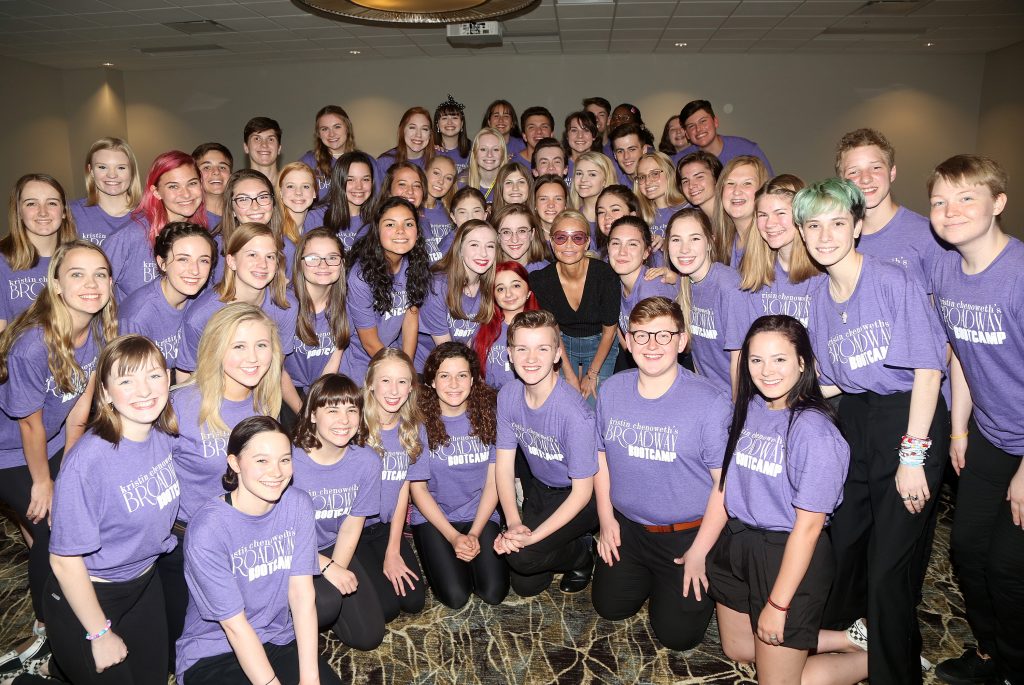
When they get together at camp, they know nobody, and then by the end of the week, they’re best friends and crying and holding onto each other. That is what I live for. Whether they become an accountant, an executive, a writer, a mom, or a dad, I want them to do it with aplomb. I want them to do it. They say experience [stays] with them for the rest of their life.
This is what I live for. I want them to soar in whatever they choose. Even when I make a mistake, I want them to see it because (A) nobody’s perfect. (B) we don’t always make the right decision and (C) How are you going to handle it? I want them to know that I’m willing to learn from them. I want to learn from them. If I keep teaching what I know, I will learn too.
Narrator: To check out Kristin’s latest projects or see if she’ll be performing near you, check out her website at officialkristinchenoweth.com. We’ll be right back with a bonus interview from Joanne Rogers, the wife of Mister Rogers, who talks about the film featuring Tom Hanks, who plays Mister Rogers, after this brief message about two holiday projects from Kristin Chenoweth that will debut on television this holiday season!
Narrator: Kristin Chenoweth stars as a youth choir director who needs to write a big song for a Christmas Eve show but is distracted when a boy with a golden voice joins her choir, which comes as a surprise to his widowed father.
Kristin: I play a choir director who used to be a Broadway star, but gave it all up to have kids’ choir. A kid comes in from across town, and [the movie is about] him being integrated into this choir, what it means, who he is to her, who she is to him, and how it all unfolds. It’s a beautiful, beautiful story and naturally, with Hallmark, it looks beautiful.
Narrator: Don’t miss A Christmas Love Story debuting on the Hallmark Channel on December 7th.
[embedded content]
And, you’ll love hearing Kristin singing carols in concert with one of the most celebrated choirs in the world.
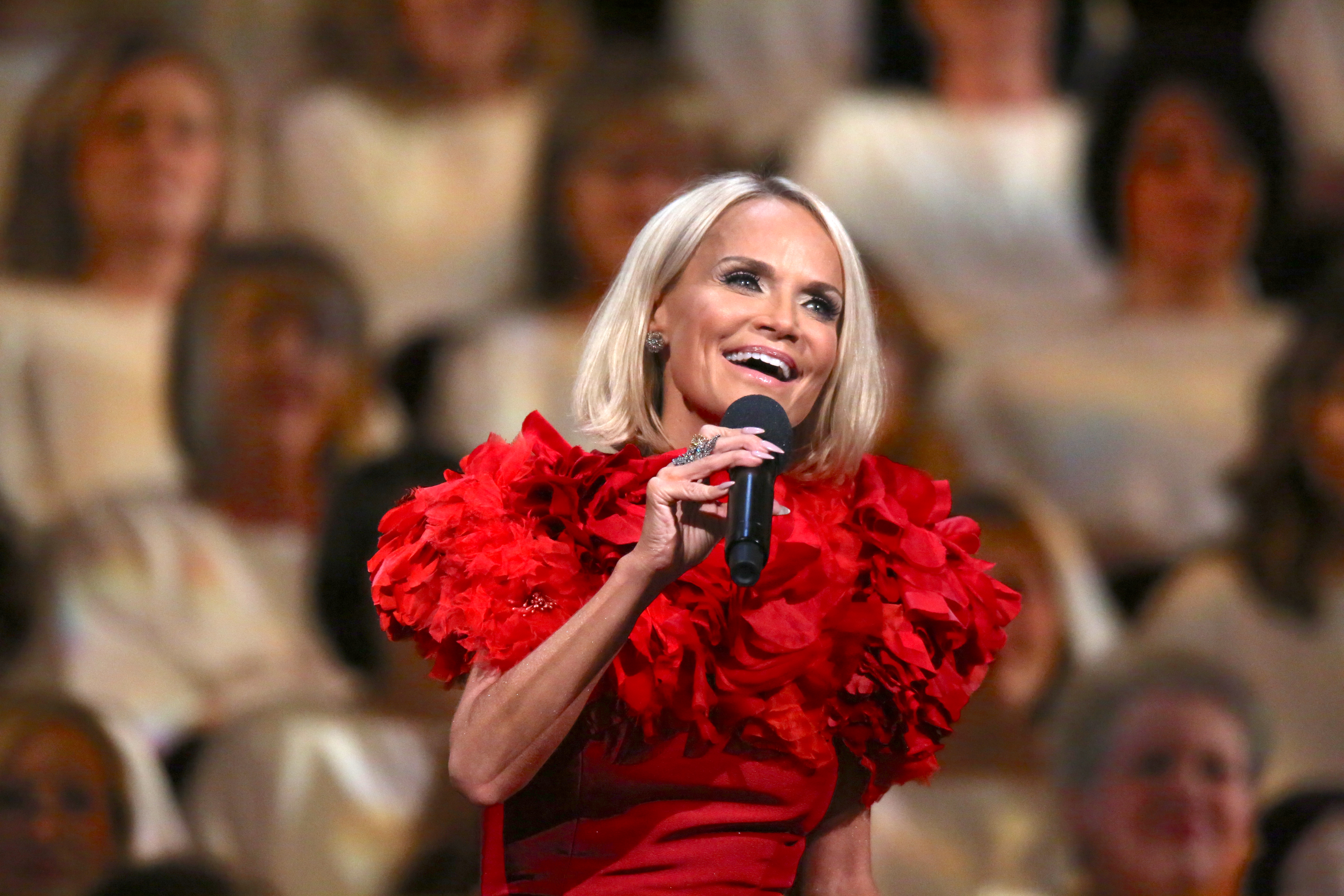 Kristin: I’m very proud of it. It’s both classical in nature and soft pop. We have a Karen Carpenter song in there. We have, “Mary Did You Know?” We have a lot of the great Christmas things. We have a lot of more classical singing that I got to go back to my roots to do.
Kristin: I’m very proud of it. It’s both classical in nature and soft pop. We have a Karen Carpenter song in there. We have, “Mary Did You Know?” We have a lot of the great Christmas things. We have a lot of more classical singing that I got to go back to my roots to do.
Narrator: Kristin Chenoweth’s Christmas Concert with the Tabernacle Choir will air during the holidays on PBS.
Living Life with America’s Best Neighbor
Narrator: Right now, the world is hungry for stories of kindness—and who better to share in a story of kindness than America’s favorite neighbor? Tom Hanks portrays Mister Rogers in the brand-new film A Beautiful Day in the Neighborhood, based on the true story of a real-life friendship between Fred Rogers and jaded journalist Tom Junod. Today, we are honored to welcome Mrs. Rogers, who is Fred’s beloved wife Joanne, to learn a bit more about the man behind the cardigan.
[embedded content]
Joanne Rogers: Hi, I’m Joanne Rogers. I am a mom and a grandmom and I was Fred Rogers’ wife. We met in college, at Rollins College, in Florida. He was a transfer from Dartmouth, and he came down to Rollins because Dartmouth didn’t have a music school at that time. He had decided that he wanted to major in music. I [had] already [been] at Rollins for one year when he arrived. I was a piano major. He was a composition major in music. He had a double major, he majored in music and in French. He was very good at languages.
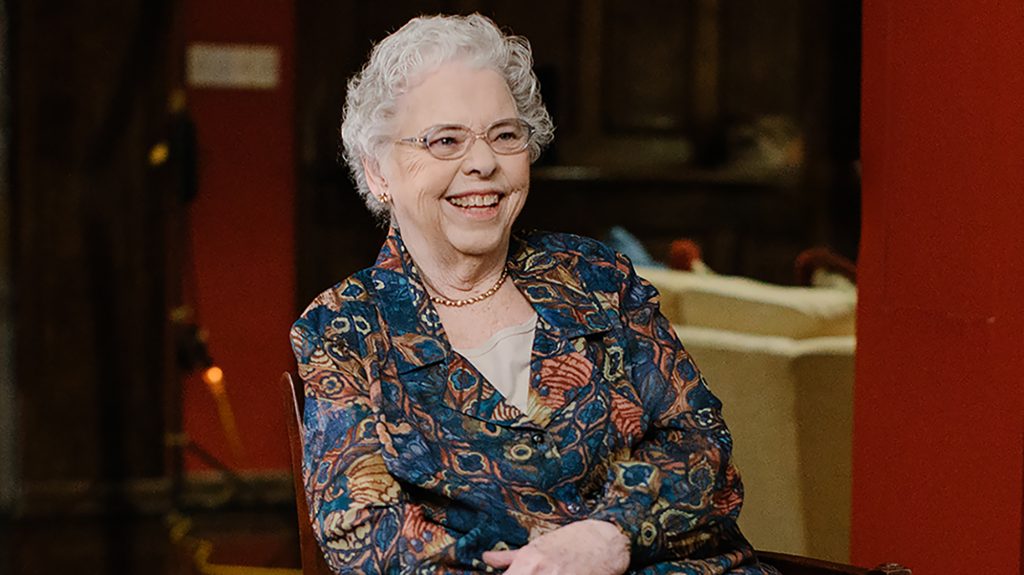
So anyway, that’s where we met, and our friendship developed. I graduated and went on to another school for graduate study in piano. And Fred, when he graduated from Rollins, then went up to New York to work for NBC. It was a kind of an apprenticeship for a couple of years there. He always was able to use the knowledge he got there.
We would write back and forth and sometimes talk, but not very often. We were both so busy, so we didn’t see each other much. And then suddenly, I got a letter asking me to be married. To him, that is to say. So, I quickly said yes and we were married in July of 1952.[Fred and I] did have a very good friendship, which I think is very important for young married people.
“[Fred and I] did have a very good friendship, which I think is very important for young married people.” – Joanne Rogers
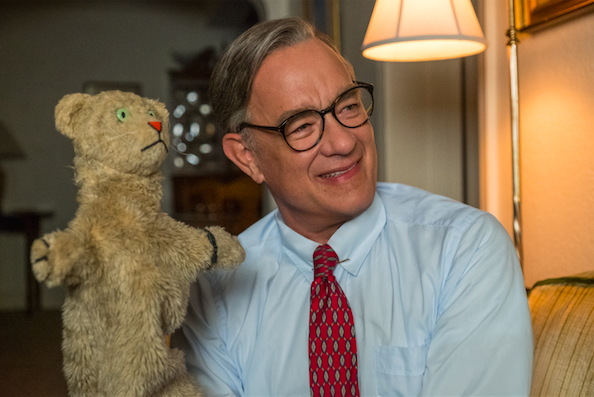 When he was really at the height of his popularity, the question that would often be asked of me was, “What’s it like to be married to Mister Rogers?” And I would say, “It’s like [being] anybody else’s wife.” Fred had pretty regular hours in the studio. He would get home, oh, around five thirty, maybe. And he would say, “Give me 20 minutes.” He’d have a little lie down, and that would be enough for him, a little nap. And then he was an early go to bed-er.
When he was really at the height of his popularity, the question that would often be asked of me was, “What’s it like to be married to Mister Rogers?” And I would say, “It’s like [being] anybody else’s wife.” Fred had pretty regular hours in the studio. He would get home, oh, around five thirty, maybe. And he would say, “Give me 20 minutes.” He’d have a little lie down, and that would be enough for him, a little nap. And then he was an early go to bed-er.
He got up at five fifteen in the morning. He did his prayer routine, and then went to swim before going to the studio. So all that got done early in the morning. He was a morning person.
“[Fred’s] program was his ministry.” – Joanne Rogers
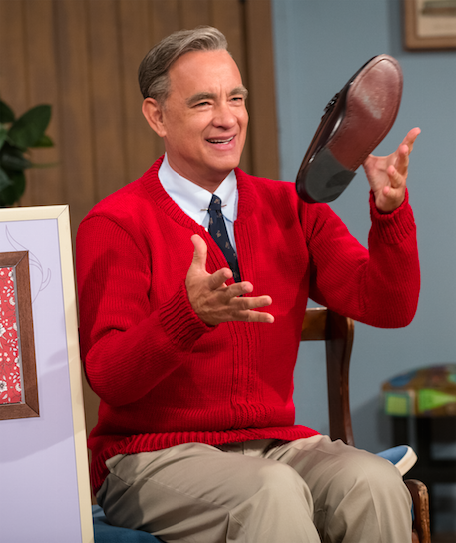 He worked hard for everything and felt responsibility for it. His program was his ministry. He was ordained to do that by the church, you know. He said, “The space between the person who’s speaking into the screen, and the person on the other side of the screen who’s watching, that is sacred space.” That was important to him.
He worked hard for everything and felt responsibility for it. His program was his ministry. He was ordained to do that by the church, you know. He said, “The space between the person who’s speaking into the screen, and the person on the other side of the screen who’s watching, that is sacred space.” That was important to him.
“Everything is so divisive right now. Someone said to me, ‘He would be on his soapbox,’ and I said, ‘Oh, no, I don’t think so. He would just be walking the walk and trying to do what he could with reconciliation.’“ – Joanne Rogers
I’d think he would do what he could to build on what hope there is, and I think it would be very important to him because he was very involved in reconciliation. I think that would be his first interest, just trying get people to reconcile with each other.
Narrator: A Beautiful Day in the Neighborhood releases in theaters nationwide on November 22.
Narrator: In the mid-90s, R&B artist Montell Jordan was living the high life. Celebrating a new marriage and a number-one smash hit single called “This Is How We Do It,” Montell began to lose touch with the values he grew up with and fell into a life that was more about partying than building a lasting relationship with his wife or a thriving career. It took one of Montell’s friends to hold him accountable before Montell realized he needed to turn his life around. Today, Montell and his wife, Kristin, minister to other couples in crisis and help them realize restoration is possible for them, if they work on their relationship each day and trust God as the foundation of their lives.
Growing Up in Church and Music
Montell Jordan: Hey, everybody. I am Montell Jordan. I am an executive pastor at a church in Atlanta, Georgia called Victory World Church. I was a former R&B recording artist, Grammy-nominated, and I went into full-time ministry in 2011. And I’m now looking to do quite a bit more musically with my wife in marriage ministry.
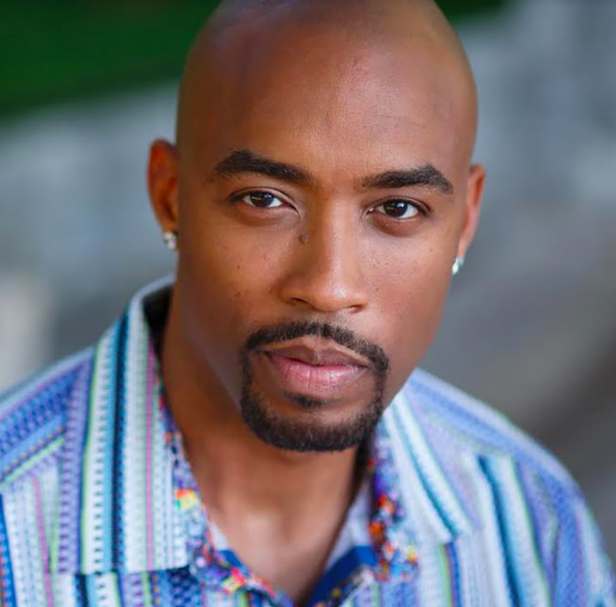
I was born in 1968 in Los Angeles, California to a lower middle class family. [I was the] oldest child of four. I have a younger brother and two younger sisters. [We had] fantastic parents. I was brought up as a church kid. I was a child musician, playing piano in my church, around the time I was nine or ten years old.
We lived, ate, slept, breathed church regularly, and that was the foundation of my upbringing. I would say that a lot of times I was in church, but church wasn’t always in me. I say that from the standpoint that I knew all the technical things to do about being in church, the musical things to do about being in church, but in regard to having a real personal relationship with Jesus or being in tune with what the Holy Spirit was, all those things were foreign to me.
“A lot of times I was in church, but church wasn’t always in me.” – Montell Jordan
A lot of those church musicians that I worked with, back at that time, would eventually become my band members and producers of the hit records that I would later start having in my musical career. [Being] brought up on the West Coast, I had musical sensibilities, as a child, from everything R&B music—Luther Vandross and Morris Day in the Time and Prince, Michael Jackson, and Lionel Richie—to a lot of the early pop music like Phil Collins and Cyndi Lauper. Music, for me early on, was a strange dichotomy, simply because being brought up in church, yet having world music sensibilities, [it was] always very taboo in the time period that I was coming up.
I started experimenting with different styles of music—with pop music and country music and R&B music—all the way up through college. And that’s what started to lead me toward to the fusing of hip hop and R&B music.
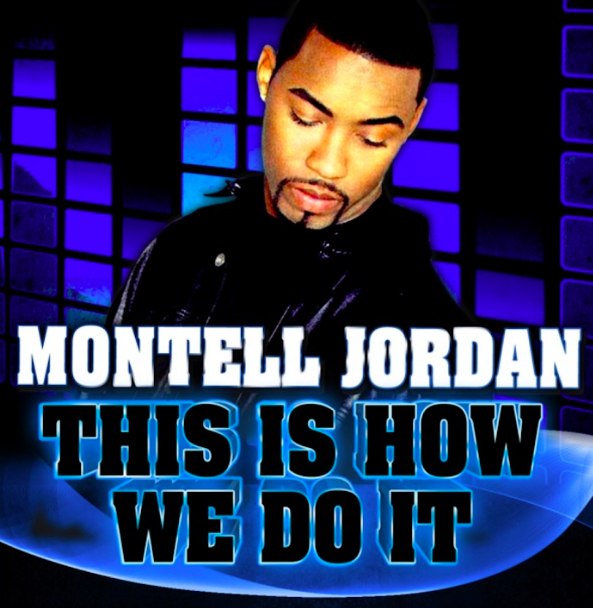
I was working a job after college, preparing to go to law school, and I really felt like, Man, if I’m ever gonna take a crack at this music business, now is going to be the time. So I stacked up as much money as I could, tucked away in a little apartment, and created a demo tape. It made its way into the hands of Russell Simmons at Def Jam Records, who was trying to expand his label out to the West Coast. He kind of deemed me his West Coast documentary rap singer, and the moment I got a record deal, one of the first songs I started recording was “This Is How We Do It.” It would become my first single. It would become my first number one record. It would become Def Jam’s first number one record and would go on to sell millions of records twenty-something years later, still be something that marked a period of time. It still seems to do that to this day.
“Success did not come with an instruction manual.”
Everything changed for me, having a number-one record as your first record out of the box. I didn’t recognize that great success did not come with an instruction manual. There was no textbook saying, “Hey, here’s what you do when you get large amounts of money. Here’s how you should spend it. Here’s how you should invest.” [I didn’t know] that a lot of the music business is based on perpetual debt, that you basically owe the record label albums and money and everything is recouped. Boy, I learned that word recoupment early on in the process, and through that I would get the fame and the accolades and most of the money. I would be going to the record labels and writers and producers.
“Everything changed for me, having a number-one record as your first record out of the box. I didn’t recognize that great success did not come with an instruction manual.” – Montell Jordan

Life changed, because I got married a couple of months right before my song hit. I didn’t know how to do marriage well. I didn’t know how to be a good husband, but I knew how to do artistry, so I put that at the forefront of our marriage.
I want to say, in either 1995 or 1996, I was only at home in my own bed thirteen days out of the year. I was on the road the entire other portion of the year. So if you can imagine only being in your own bed thirteen days out of a year, that has to take its toll on a marriage. It started me down a pretty dark road of relationships and friendships that were outside of my marriage. Cheating, adultery, all of those things that were hidden. And it came to a head when someone who was a close family friend, and one of our business associates, loved us enough to expose me. To basically say, “I can’t do this anymore. Our friendship cannot continue like this. If you don’t share this with your wife, with my friend, then we can’t go on.”
I said, “I would rather tell and lose everything, or lose half of everything, in this process rather than losing my life.” And that was where everything kind of came to a head, me telling her [my wife] what was going on in our marriage and in my life. She asked me to leave the house.
The same person that had that caused me to expose my indiscretions to my wife was also the same person that asked my wife, “What is God telling you to do in this situation?” Would she ask God what he wanted her to do? [Our friend] asked her to stay and said that her life and my daughter’s life would depend on her staying. The rebuilding of trust process that began is a process that still continues to this very day.
To fast forward to this day, we have a great marriage. We do marriage ministry together. We have very strong kids and grandkids. We’re in the faith. We’re in ministry. it hasn’t been like, “It took us a year to recover.” We are still regularly recovering to make sure that that we maintain what God restored.
“[My wife Kristin and I] are still regularly recovering to make sure that that we maintain what God restored.” – Montell Jordan
Sharing Your Story Can Heal Others
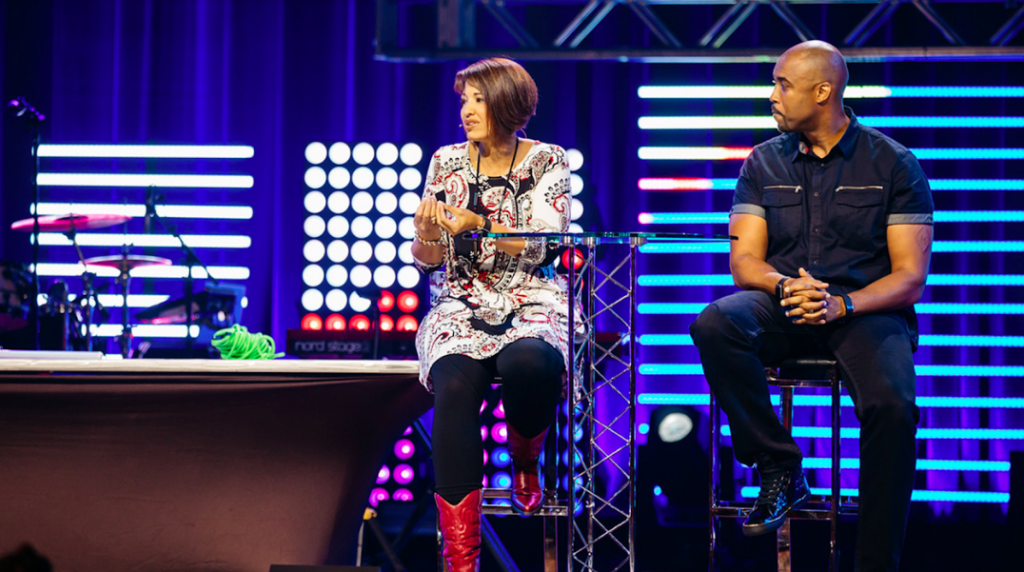
As we started getting closer to what ministry life would look like, [my wife] had been doing ministry by helping write books and being a part of women’s ministry, speaking into young girls’ lives. I was still the recording artist, going out and traveling. We had been navigating through a bankruptcy. I like to call it a wilderness period of time where we were basically surviving on day-to-day provision from God, somehow making a way, and more and more music industry doors started to close. Label opportunities started to close. The ministry door started to open.
I guess that when God closes the door, no man can open it. And when he opens the door, no man can close it. Someone had asked us one day, in a youth group that we were a part of, “Hey, what are you guys passionate about?” We were like, “Oh, we don’t know.” They were like, “What would do you good at?” And [we said], “You know, we’ve been really working on our marriage,” and they were like, “Okay, great. You should be teachers on marriage. If we get together a group, a couple of other married couples, can you guys speak into their lives?” We were like, “Well, yeah, I guess.”
”When God closes the door, no man can open it. And when He opens the door, no man can close it.” – Montell Jordan
And so we went and we created a message. And I said, “Hey, that was really good. Can you do part two of it? Can you do part three of it? Can you do more of it?” We spent a year [doing it] In the first quarter, we did a message that had eleven couples in the room, and then when we came back for part two, we had like twenty couples in the room. We got to part three and we had like forty-four couples in the room. And by the time we got to the end of the year, we had like seventy couples in the room. It just kept expanding into, “Hey, maybe this is something that people need, and our story is something that makes sense to people who are navigating through landmines and fields that we’ve already crossed.”
“Maybe this is something that people need, and our story is something that makes sense to people who are navigating through landmines and fields that we’ve already crossed.” – Montell Jordan
Every instance that God brought us through allowed us to give more insight to others who are either coming out of it or still in the midst of that struggle in their own marriages. So we become a lighthouse or a template for people. Most lighthouses are not on land, tey’re actually built on rock, they’re actually out in the midst of the storms, still out in the water. So we’re trying to allow couples to be able to see that even if you’re in that storm, a lighthouse is here to help guide you back to shore. Back to the rock. Back to safety in God.
We’re trying to reach a million marriages. We felt like if we can start at that place, one couple at a time, or as many as God will allow us to reach, that we’re willing to invest that time into couples and into people who desire to be married.
Narrator: In the midst of his duties as a husband, father, and pastor, Montell still makes time to create music. Recently he released a new album, and Montell talks about the brand-new single called “When I’m Around You,” and why he was excited to collaborate on it with his friend, Christian hip-hop artist Lecrae.
Becoming God’s Masterpiece
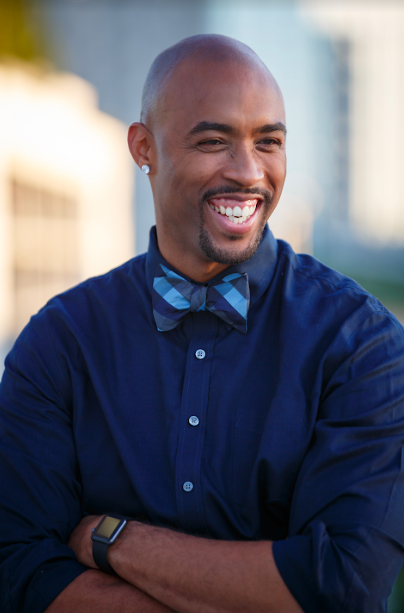
The new album is called Masterpiece, and it is a R&B album. You hear me talking about Him restoring marriage. And if you’re not a spiritual person, it just sounds like a fantastically, highly encouraging album, voting love between couples. But I don’t shy away from God on the album. I just didn’t want to say, “It’s an album for the church.” It’s an album from the church for the world.
So the same world that I reached before, I’m trying to reach them now, with family and marriage and promise and faithfulness. And to still do it over hot records. That’s what the album is. I’m excited about it.
The first song came about because Lecrae and I are friends. My wife, Kristin, and Dara, his wife, are friends. We travel together. We do life together. Iron sharpens iron together. And as my friend, I normally wouldn’t ask my friend to do that. It just so happens that I have a friend who’s one of the hottest rappers on the planet, so I stepped out of the box and said, “Hey, would you be willing to do this?” He accepted, and his label allowed us to be able to work together.
We all are, in some ways, reinvented. I think it’s different when we reinvent ourselves and when God reinvents us. I’ve been through the process of trying to reinvent myself and finally allowing Him to create in me what He’s probably been desiring for my life for a long, long [time].
I think what’s cool about music for me now is that I can create love songs from the one who knows more about love than anybody else.
Narrator: Follow Montell on social media find more information about his music and marriage resources.
If you’d like these kinds of stories, about spreading love to friends and neighbors, check out our interview with radio host Delilah.
Narrator: Next time on the Jesus Calling Podcast, we talk with author, speaker, and leadership coach John Maxwell. When you look at John’s vibrant career, it’s hard to deny his incredible success. But John says he gained wisdom not from his successes, but from something else.
John Maxwell: I’ve learned a lot more from my failures that I have from my successes. When I’m succeeding, it’s like, “Let’s just celebrate.” But what I’m failing, I’ve said, “Okay, something’s wrong here. I’ve got to figure this out.” What I teach people all the time is to fail forward. That as you fall, just go three feet, fall forward and get back up. You’ve already gained three feet. All my life, I’ve done a lot of of failing forward.
Narrator: Do you love hearing these stories of faith weekly from people like you whose lives have been changed by a closer walk with God? Then be sure to subscribe to the Jesus Calling: Stories of Faith Podcast on iTunes, Stitcher, or wherever you listen to your podcasts. If you like what you’re hearing, leave us a review so that we can reach others with these inspirational stories. And, you can also see these interviews on video as part of our original web series with a new interview premiering every other Sunday on Facebook Live. Find previously broadcasted interviews on our Youtube channel, on IGTV, or on www.jesuscalling.com/media/video.
